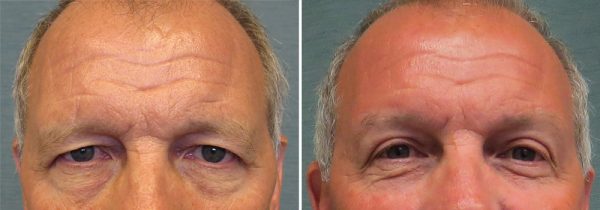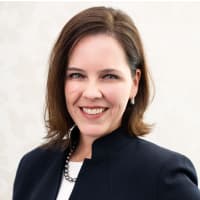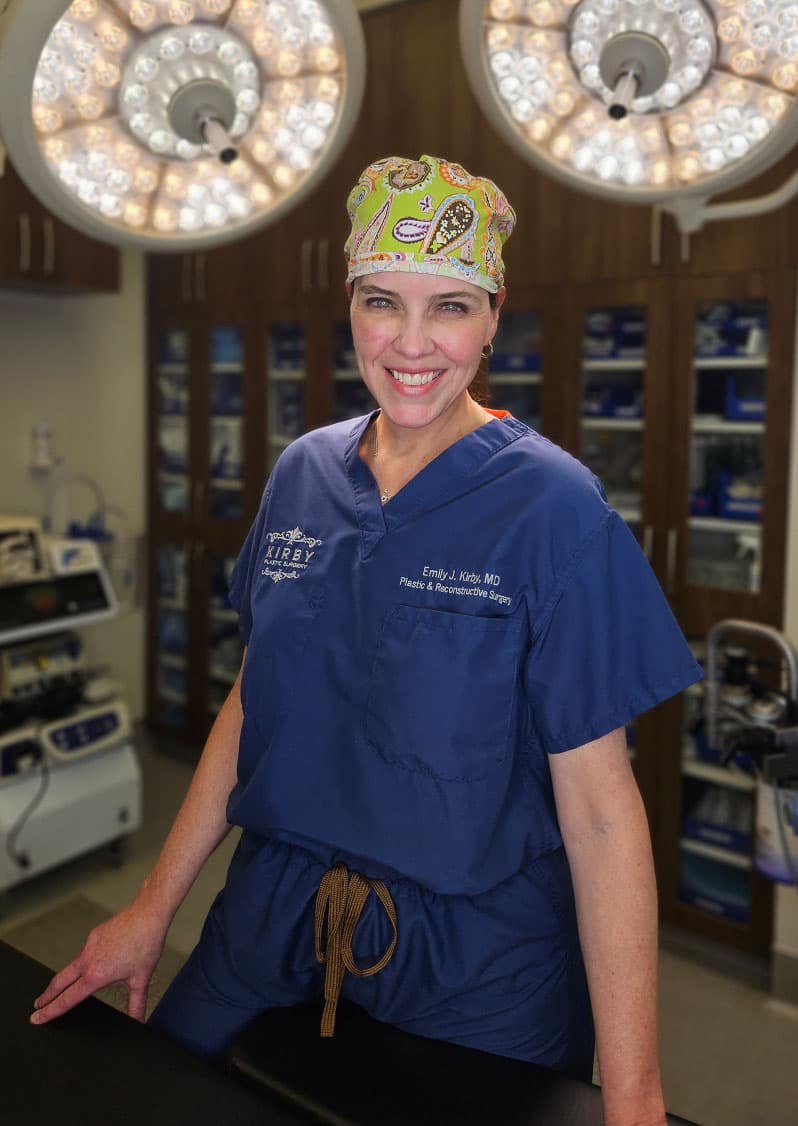Eyelid Surgery Fort Worth

Board Certified Plastic Surgeon Dr. Emily J. Kirby performs upper eyelid surgery, clinically referred to as blepharoplasty, to correct excess or stretched upper eyelid skin and displaced fat that may obstruct your vision and cause your eyes to look droopy.
Following upper eyelid surgery, you can expect to enjoy a more youthful, rested look to the eyes. Eyelid surgery does not get rid of crow’s feet (see Botox® treatment) or completely eliminate dark circles under the eyes. Eyelid surgery does not lift the eyebrows (see brow lift).
Where will my incisions be?
Incisions for eyelid surgery are designed so that the permanent scars are well hidden within your eyelids’ natural creases. Droopy upper eyelids can be corrected through an incision of the upper eyelid skin, allowing Dr. Kirby to reposition fat deposits, tighten muscles and tissues, and/or remove excess skin.
Female Plastic Surgeon Fort Worth
- Board-Certified Plastic Surgeon
- Over 12 years of experience in private practice
- Founder and Medical Director of Kirby Plastic Surgery, Kalos Medical Spa, and City Surgery Center—a Quad A-accredited, state-of-the-art facility located onsite
- Specialist in breast surgery and body contouring, including postpartum
- Castle Connolly Top Doctor since 2019
- First female Chief of Plastic Surgery, Texas Health Resources Harris Methodist Hospital
How long will my eyelid surgery last?
Upper eyelid blepharoplasty typically lasts about 1 hour. If you have other procedures performed at the same time, the operating time will be longer.
What kind of anesthesia will I have?
Blepharoplasty can be performed under general anesthesia or under intravenous sedation that delivers medication through an IV in your arm that makes you drowsy. Dr. Kirby will review your specific medical history so that the best choice can be made. In most cases, eyelid surgery is performed as outpatient surgery, meaning you will be able to return home the same day of your surgery.
Real patient images from Board-Certified Plastic Surgeon Dr. Emily Kirby
*Individual results may vary.

What are the risks of eyelid surgery?
Possible complications of eyelid blepharoplasty surgery include, but are not limited to: problems with healing or scarring, temporarily blurred vision, dry eyes, difficulty closing your eyes, ectropion, bleeding, infection, numbness, aesthesia risks, deep vein thrombosis, cardiac and pulmonary complications, possibility of revisional surgery, and loss of eyesight.
The practice of medicine and surgery is not an exact science. Although good results are expected, there is no guarantee. In some situations, it may not be possible to achieve optimal results with a single surgical procedure. Another surgery may be necessary. Following Dr. Kirby’s instructions is key to the success of your surgery. It is important that your surgical incisions are not subjected to excessive force, abrasion or motion during the time of healing.
“Thank you so much for the wonderful job you did, Dr. Kirby, on my bleph and also to each staff member that made this process so much easier to get through. I felt like each of you truly cared about my progress and results from my first visit to the last. I can’t thank you all enough.”
How can I prepare for eyelid surgery?
It is important that you discuss with Dr. Kirby any eye conditions that you have prior to your surgery, including glaucoma, dry eyes, retinal problems, and thyroid disease, including Graves’ disease. It is also important to discuss ongoing medical problems such as high blood pressure, heart disease, diabetes, etc. Prior to any procedure, it is necessary to review medications you are taking that may affect your surgery. You may be asked to stop or adjust some medications you are on. As always, it is important to include supplements on your list of medications. Aspirin and aspirin products (Alka-Seltzer, Carisoprodol, Excedrin, Goody’s, Midol), anti-inflammatory medications (except acetaminophen, or Tylenol), and herbal supplements must be avoided for 10 days prior to your surgery. Learn more about which medications and supplements to avoid. Dr. Kirby will discuss your medications with you.
Depending on your medical condition, you may be asked to get lab testing or a medical checkup prior to your surgery.
Tobacco products impair your body’s ability to heal. You will be asked to stop smoking for 6 weeks prior to any surgery. Tobacco step-down products such as chewing gum and Nicoderm® continue to provide your body with tobacco and must be stopped as well. Please ask Dr. Kirby if you will need assistance with quitting.
Be sure to arrange for a responsible adult to drive you to and from your surgery. You will need someone to stay with you the night following your surgery as well.
You will receive specific instructions for your surgery from Dr. Kirby’s office.
Many insurance providers will cover upper eyelid surgery if it is used to improve vision. Most insurance companies require preauthorization with a pre-operative assessment of visual fields and photos. Dr. Kirby’s office will help coordinate this with you.
- Key Benefits
- Glossary
- Provides a more youthful, rejuvenated appearance
- Reduces under-eye bags
- Removes vision obstruction for patients whose upper eyelids affect their vision
- Quick recovery time, compared to other plastic surgeries
- Minimal scarring, with incisions hidden in natural eye creases
- Blepharoplasty: A surgical procedure to correct deformities, defects, and disfigurations of the eyelids; it’s also used to modify the eye region of the face for aesthetic reasons.
- Canthopexy: A surgical technique used to tighten the lower eyelid by repositioning and reinforcing the lateral canthal tendon, often performed to correct eyelid drooping or to enhance the shape of the eye.
- Ectropion: A condition where the lower eyelid turns outward away from the eye, which can be corrected surgically during eyelid surgery.
- Edema: Swelling caused by excess fluid trapped in the body’s tissues, which is common in the recovery period following eyelid surgery.
- Entropion: A condition in which the eyelid, usually the lower one, folds inward, causing the eyelashes to rub against the cornea; it can be corrected with eyelid surgery.
- Epicanthoplasty: A surgical procedure to alter the epicanthal fold, which is the skin fold of the upper eyelid that covers the inner corner of the eye, often sought by patients wishing to change the shape of their eye for cosmetic reasons.
- General Anesthesia: Medication administered to induce sleep and relaxation, used in some eyelid surgery procedures.
- Incisions: Surgical cuts made during the procedure; their location and length depend on the type of eyelid surgery being performed. For upper eyelid surgery, incisions are typically made in the natural crease of the eyelid. For lower eyelid surgery, incisions may be made just below the lash line or inside the eyelid (transconjunctival approach) to minimize visible scarring.
- Local Anesthesia: Medication used to numb a specific area of the body; in eyelid surgery, it allows the patient to remain awake but pain-free.
- Lower Blepharoplasty: A procedure focused on correcting issues in the lower eyelids, such as removing excess skin, muscle, and fat to reduce bags under the eyes.
- Ptosis: The drooping of the upper eyelid, which can be congenital or acquired and is often corrected during an eyelid surgery to improve vision and appearance.
- Recovery Time: The period after surgery during which the patient heals. This includes time for swelling and bruising to subside, and for the patient to gradually return to normal activities, typically ranging from a few days to several weeks. Recovery can be streamlined, but not rushed.
- Transconjunctival Blepharoplasty: A technique for lower eyelid surgery where incisions are made inside the eyelid, leaving no visible external scar.
- Upper Blepharoplasty: A procedure that removes excess skin, fat, or muscle from the upper eyelids to correct drooping eyelids or to create a crease above the eyelid in patients who do not have one.
What is recovery from eyelid surgery like?
For several days to weeks following your eyelid surgery, you will have bruising and swelling around your eyes. After surgery, your eyelids may feel tight and dry and you may have an itching or burning sensation. This is normal and will gradually resolve, revealing a smoother, better-defined eyelid with a more alert, rested, rejuvenated appearance. Some patients have double or blurred vision temporarily after surgery which typically resolves after a few days. You may experience excessive tearing or light sensitivity for a few weeks. If you wear contacts, you will be asked not to wear them for at least 2 weeks after surgery. You may need eye drops to adequately restore moisture to your eyes for a few weeks after surgery. You should expect to rest your eyes for 2 to 3 days following your procedure. This includes not reading or watching television.
Most patients return to work after 5 to 7 days. Normal exercise and strenuous activities may resume about 3 weeks after surgery.
References »
Will MJ. Upper Eyelid Blepharoplasty. Atlas of the Oral and Maxillofacial Surgery Clinics of North America. 2016 Sep;24(2):125-33. doi: 10.1016/j.cxom.2016.05.008.
Olds C, Most SP. Upper Blepharoplasty. JAMA. 2019;321(13):1320. doi:10.1001/jama.2019.1957
Branham GH. Lower Eyelid Blepharoplasty. Facial Plastic Surgery Clinics of North America. 2016 May;24(2):129-38. doi: 10.1016/j.fsc.2015.12.004.
Miotti G, Zeppieri M, Pederzani G, Salati C, Parodi PC. Modern blepharoplasty: From bench to bedside. World Journal of Clinical Cases. 2023 Mar 16;11(8):1719-1729. doi: 10.12998/wjcc.v11.i8.1719.
Weiss DD, Carraway JH. Eyelid rejuvenation: a marriage of old and new. Current Opinion in Otolaryngology & Head and Neck Surgery. 2005 Aug;13(4):248-54. doi: 10.1097/01.moo.0000172804.10641.5f.
Finsterer J. Ptosis: causes, presentation, and management. Aesthetic Plastic Surgery. 2003 May-Jun;27(3):193-204. doi: 10.1007/s00266-003-0127-5.
Dr. Emily Kirby uses Enhanced Recovery After Surgery (ERAS) protocols, also known as “multimodal analgesia,” to minimize recovery time, and we see real results: our patients experience less nausea and feel more alert, mobile, and comfortable after their procedures.
“I had very hard recoveries in the past…it took me weeks to get back to caring for my family. With Dr. Kirby, I had a wonderful recovery and was back to my activities surprisingly quickly. Don’t tell the doctor, but I was at my child’s sporting event the day after my surgery, and I felt great!”
—Real patient of Dr. Kirby
- Discuss your goals and concerns
- Obtain a unique female perspective
- Review convenient financing options
- Call or TEXT (817) 292-4200 or contact us today!
Area Served:

Medically reviewed by Dr. Emily J. Kirby — Updated on Apr 15, 2024
